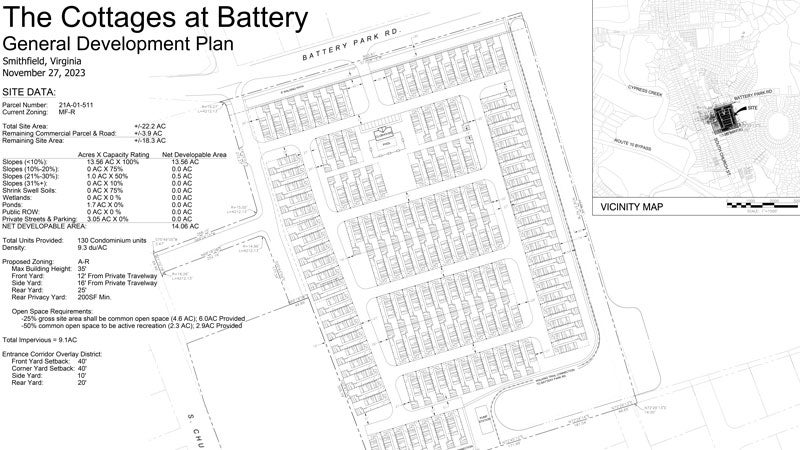Suffolk developer buys 14 acres behind Smithfield Royal Farms
Published 4:42 pm Wednesday, April 3, 2024

- A revised site plan for 14 acres behind the Royal Farms gas station shows 130 single-family homes, down from the 150 condominiums approved for the site in 2020. (Image courtesy of Town of Smithfield)
A month after Smithfield’s Town Council approved a Suffolk developer’s requested rewording of the town’s zoning ordinance, the land at the heart of the matter changed hands.
According to Isle of Wight County land transfer records from March, developer Brian Mullins of Suffolk-based Quality Homes Inc. has acquired the 14 acres behind the Royal Farms gas station at the corner of Battery Park Road and South Church Street, where he’s proposing to build a 130-home condominium-style community called “Cottages at Battery.”
The county’s Circuit Court recorded a $3.4 million deeding of the land to “Cottages at Battery LLC” from “Seasons at Battery Park,” an alternate name the project’s former developer, John Mamoudis of Virginia Beach, had used in 2020 for the then-proposed 150-unit multifamily housing complex he’d dubbed the “Park at Battery.”
The 130 units Mullins is planning wouldn’t be located in the 10-plex buildings Mamoudis had proposed but rather would be detached, roughly 1,000- to 1,300-square-foot one- and two-story houses, albeit still under condominium-style ownership.
Mullins plans to seek rezoning to attached residential. In February, he’d sought and received a change in the town’s definition of attached residential zoning that will allow him to apply for special use permits for any elements that conflict with the town’s stated attached residential standards. Prior to the change, the town’s definition had allowed detached homes in attached residential zoning only if such units don’t comprise more than 25% of the total units planned.
Under Mullins’ proposed method of ownership, the land wouldn’t be subdivided into individually owned lots, but rather each house’s exterior and the land surrounding it would be maintained by a homeowners association.
Mullins, at the town Planning Commission’s December meeting, estimated home prices would start at $350,000, up from the $190,000 starting price Mamoudis had proposed in 2020.
Though the ordinance change and sale are now both approved, Mullins still must file his rezoning application.
Town staff have advised that Mullins will also need to seek an amendment to the town’s future land use map in its comprehensive plan, a Planning Commission waiver to allow non-contiguous open space and three special use permits. One would allow the proposed 9.3-unit-per-acre density, up from the present eight-unit-per-acre maximum. Another would allow smaller lot widths. The third would waive parking and loading requirements.





